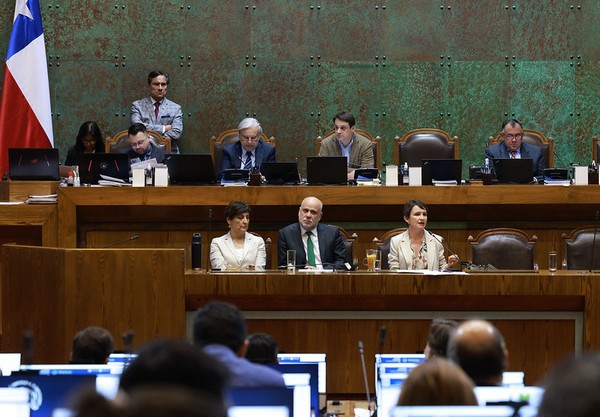Joint committee resolved disagreements on communication interception and changes in jurisdiction for high-complexity cases.
The Chamber passed into law the bill establishing new regulations that define and penalize terrorist crimes, after approving the joint committee's report.
The text is part of the "Security Agenda" and is an initiative combining a consolidated message with four motions from senators. It was approved with 102 votes in favor, 17 against, and 13 abstentions.
The new legislation penalizes terrorist associations and establishes crimes and penalties according to the level of involvement in the terrorist organization.
The joint committee's report resolved two pending points of disagreement between the House and the Senate: the inclusion of communication interception measures and the exceptional change of jurisdiction for cases with high-profile implications.
With this approval, the text is now ready to be enacted by the President of the Republic.
A point highlighted by Interior Minister Carolina Tohá. She also emphasized that this law aims to prosecute terrorist organizations and individual terrorism.
PL anti-terrorism law
Specifically, regarding interception, the joint committee largely adopted the provision approved by the House. Article 19 states that, in investigations of crimes covered by this law, at the request of the Public Prosecutor's Office, the judge may order the interception of one or more telephone or mobile data transmission networks.
This interception may also be requested in cases of crimes related to drug trafficking, arms control, and illicit association laws.
This will be done using technologies that simulate telecommunications transmission systems
or other similar technologies to monitor IP addresses, georeferencing, or device location.
Records obtained that are irrelevant or unnecessary for the investigation must be deleted from all records. Additionally, the joint committee specified that the National Prosecutor will establish procedures for the storage, preservation, and secure destruction of obtained records.
Finally, misuse of this authority will result in disciplinary actions, without prejudice to applicable criminal penalties.
Jurisdiction
The second resolved point concerns jurisdiction rules. In this case, the proposal adopts the norm approved by the Senate (later removed by the House). It ultimately defines that both the Public Prosecutor's Office and the defendant's defense may request a change in the court's jurisdiction.
This applies to crimes classified as terrorist under the law, in cases of public alarm or special complexity, provided the change is deemed essential for the investigation's success and does not substantially violate the defendant's right to defense.
The change may be requested once the investigation is formalized and before the oral trial preparation hearing concludes, to the Full Court of the Supreme Court. The request will seek to transfer jurisdiction to the Guarantee Courts and the Oral Criminal Trial Court under the jurisdiction of the Court of Appeals
of Santiago.
Support for amendments
The Chamber debate focused on the inclusion of the tool known as IMSI Catcher in telecommunications interceptions for terrorist crime investigations.
For some, this system is positive and effective in combating terrorism. It was also noted that its use is clearly restricted—as established in House procedures and now supported by the joint committee—to obtaining geolocation data and device identification, and never the content of communications.
Supporters of this law also emphasized that it sends a strong signal by increasing penalties—up to life imprisonment—for terrorist crimes.
The PC caucus generally praised the new anti-terrorism law, stressing that it replaces a rule used during the dictatorship to persecute opponents. However, they criticized the inclusion of the IMSI Catcher in the joint committee, as it affects individuals unrelated to the crimes under investigation. Specifically, Deputy Alejandra Placencia (PC) stated that this poses a direct threat to fundamental rights like communication privacy and its arbitrary inviolability.







Comments (0)
No comments yet. Be the first to comment!
Leave a comment